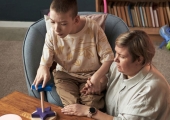New Study Shows Support Among Irish For Increased Expenditure On Overseas Aid
MORI/UNFPA study reveals:
MORI/UNFPA study reveals:
- Increased support among Irish for spending on reproductive health in developing countries
- Support for sex education in Irish schools by the majority
The Irish Family Planning Association has welcomed a new study which shows that more than half of the Irish public think that the Government's expenditure on Overseas Development Aid is still too low.
The joint MORI/UNFPA study, conducted in the spring, examines the Irish public's perceptions of population issues in the developing world. The findings of the study were released today, on behalf of the authors, by the IFPA.
Foreign Aid
According to the IFPA's Chief Executive, Tony O'Brien, "the support shown by the Irish public for increased ODA expenditure is heartening and should act as an incentive for the Government to ensure that Ireland's ODA target of 0.7% of GNP is met within the shortest possible time-frame."
According to the MORI/UNFPA study, 56% of Irish people believe that we spend too little on development aid and a further 20% didn't know or were unable to express an opinion. Only 1% said we spend too much.
"The Government's commitment to reach the UN recommended target of 0.7% of GNP by 2007 is far too remote and simply long-fingers investment in overseas development. Given the public support for such investment, which is borne out by the findings of this MORI/UNFPA study, the Government should bring forward its commitment and attempt to achieve the UN target by next year. After all, the UN target was set thirty years ago and it is high time that we fulfilled it. Excuses for not fulfilling this target, such as a high level of national debt and general recession, are no longer applicable," said O'Brien.
Attitudes to Reproductive Health Services
Commenting on the aspect of the study which dealt with Irish attitudes to reproductive health care, Tony O'Brien said, "while the level of commitment shown by the current administration to reproductive health care in the developing world has been appalling, there is a strong belief among the Irish public that the Government should help fund contraceptive and family planning advice in poorer countries. Half of the public support expenditure on sex education programmes and advice on how to avoid sexually transmitted disease in the developing world."
The study shows that 51% believe that the Irish Government should help fund contraceptive and family planning advice; 50% agree with the provision of sex education in schools and 49% agree that the Irish Government should help fund advice programmes on how to avoid sexually transmitted diseases.
"Despite the rising death toll in developing countries from reproductive related causes, including HIV and AIDS, the Irish Government's commitment towards funding and promoting reproductive health programmes in the developing world is abysmal. In fact, we have one of the worst record's of funding such programmes among donor countries," he said.
The IFPA welcomed the high awareness levels among Irish people of the HIV/AIDS crisis in developing countries. In the study, the Irish public identified HIV/AIDS as one of the most important issues facing developing countries. One in four of the Irish public spontaneously mentioned HIV/AIDS when asked about the most important issues facing the world, compared with one in five in Europe.
Attitudes to Reproductive Health Services in Ireland
Since the first MORI/UNFPA report on Irish perceptions of population issues in 1996, there has been a significant increase in the level of support among the public for sex education programmes in Irish schools. This support rose from 66% in 1996 to 71% in the latest study. Out of the 13 countries in which the MORI/UNFPA study was carried out, Ireland's support for sex education is only surpassed by Sweden, where 78% of the public favour such programmes in schools.
Tony O'Brien said, "the Minister for Education should interpret this finding as a vindication of the Relationships and Sexuality Education Programme in schools. Furthermore, it should motivate the Minister, Michael Woods, to ensure that the RSE programme is implemented in all schools without further procrastination. After all, the All Party Committee on the Constitution, in its report on abortion last year, agreed unanimously that there was a need to put in place measures to prevent crisis pregnancies. Sex education is critical to this objective."
"While half still support advice on contraception and sexually transmitted diseases, there has been a significant drop since the 1996 study."
"As access to and information about reproductive health increases in Ireland, it is perhaps inevitable that fewer see the need to make these services more available. Indeed, although the vast majority of Irish are still in favour of reproductive health services being available in their country, support for five of the individual services has fallen."
"Nonetheless, according to the study, the level of support in Ireland for five of the ten reproductive services presented in the poll is still significantly higher than the overall mean for the 13 countries included in the study. For example, 55% of Irish people believe the public should have access to advice on contraception, while in the Netherlands, this is supported by 43% of the population. This is an indication that Irish people do have liberal attitudes towards contraceptive provision and clearly, Irish people still want greater access," he said.
Awareness of NGOs
Commenting on the study's findings on public recognition of non-governmental organisations, Tony O'Brien welcomed the fact that 60% of Irish people are aware of the Irish Family Planning Association. This recognition level is the same as the level recorded in the 1996 study.
"Recognition for the IFPA has remained stable, despite the fact that the study showed an overall decline in awareness of key NGOs in Ireland, including the UN (down 11 points), the World Health Organisation (down 12 points) and the St Vincent de Paul (down 15 points)," he added.
ENDS.
Note on study on 'Population Issues in the Developing World' - A MORI/UNFPA study
This research study, Population Issues in the Developing World: an update on the Irish public's perceptions, was conducted for UNFPA (United Nations Population Fund) by MORI (Market & Opinion Research International). The fieldwork was carried out in thirteen countries in February and March (In Ireland, the research was curtailed on farms after March 1st owing to foot and mouth disease, but the data were weighted to take account of this).
A representative quota sample of 1,084 adults was interviewed across 60 sampling points in ROI from 26th February to 12th March 2001. All interviews were conducted face-to-face in-home and data have been weighted to the known profile of the population of ROI. The last research study by MORI/UNFPA on Population Issues in the Developing World was carried out in 1996.



